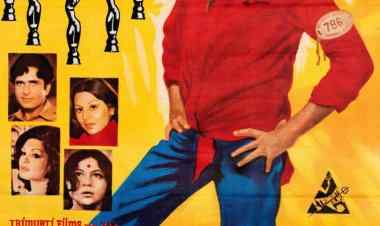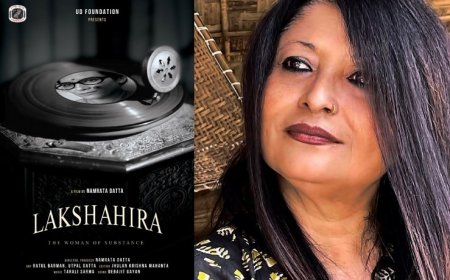The Iconic Roopkar Film Award-1975
Renowned film critic Prantik Deka pens a critical essay on the evening of Assam's first film awards ceremony – The Iconic Roopkar Film Award –
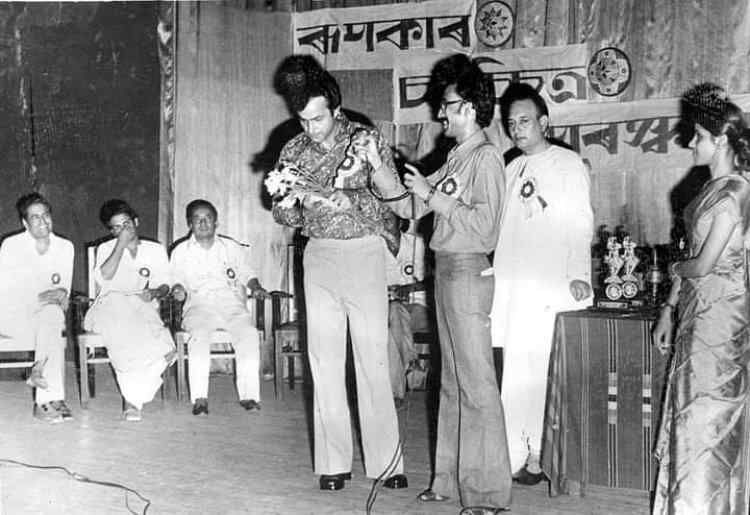
‘The pioneering Roopkar Awards event was the progenitor of many more film awards and festivals, which have since been held in Assam’, writes Prantik Deka.
The day was 19 September, Sunday, 1975. A large crowd milled in front of the Guwahati District Library from 5 pm onwards. As soon as the clock struck 6, the library building suddenly sparkled with many garlands of electric lights of various colours, creating a festive atmosphere. The nearly 14-feet high cardboard image of the 'Roopkar Film Award' flashed in front of the District Library. Acting on the advice of noted painter and cartoonist Trailokya Dutta, the cut-out figure was the result of relentless hard work put in since the morning by Muhammad Yoseph, Roopkar magazine's Kamal Lochan Das, actor Indra Bania, Dainik Asom's Paresh Pathak and young writer-journalist Naren Hazarika.
On the broad road ahead, a large number of police personnel from the traffic department, working at the behest of several senior officials, became quite busy controlling the crowds and vehicles under the supervision of the Police Superintendent of Kamrup District. The various types of vehicles coming to the event were parked one after the other in a very disciplined and systematic manner on one side of the main road so that the spectators thronging the District Library venue could enter in a well-ordered manner. In no time, crowds overwhelmed the seating capacity of the huge auditorium, even the additional seats were filled up. A number of avid readers of the Roopkar magazine and film enthusiasts ran hither and thither in the desperate hope of finding an entry card. The organisers outside were left helpless, clueless! A number of seats arranged for artistes inside the green room were also brought into the auditorium. Yet, there was still a lot of crowd stranded outside.
The programme was scheduled to take place at 6.30 pm, but several prominent guests were yet to arrive. Meanwhile, Pradip Bordoloi, owner of Eastern Printers - the reputed printer of the Roopkar magazine, eminent actors Anil Das and Domboru Das, members of the Pragati Silpi Sangha and the cultural organisation 'Aikyatan' became busy receiving the invited guests and audience, and escorting them to the seats. Finally, the Roopkar awardees came one after the other. They took their seats with their names conspicuously written, on the left side of the auditorium. Besides guests from Assamese film, theatre, music and other fields, the event also attracted an array of noted journalists representing Assam and India's reputed newspapers, dignitaries from various walks of life, noted cultural figures from Bengal, fans, enthusiasts, and even politicians.
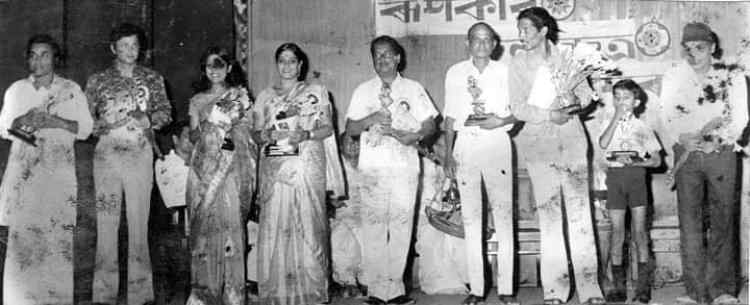
Image: Roopkar Film Award Winners
They include several key members of Sivasagar's Seuj Bolchhabi Santha, the production unit of the best film 'Chameli Memsaab' – best director Abdul Majid, best story writer Nirode Chaudhury, leading hero and best actor George Baker with his wife, best cinematographer Kolkata's Bijoy De, better known as Gopi in the circles, best actress Binita Gohain (Mitra), who descended from Kolkata especially for the event, accompanied by husband, sound recordist Prabir Mitra, best supporting actress Rani Pathak with her husband, actor-writer Dr Chandan Pathak, best music director and best singer Dr Bhupen Hazarika, who pushed his way through the crowd of people to get into his seat. After taking their seats, they were put on Roopkar's badges.
Soon enough, the West Bengal Information and Broadcasting Minister Subrata Mukherjee along with his wife and mother, and the secretary of West Bengal Students' Council entered the enormous auditorium, followed by the handsome and charming Basanta Choudhury, a veteran actor from Bengal and a well-known scholar of a special department in the history of the North Eastern region, Assam's Minister of Culture and Home Affairs, Hiteshwar Saikia accompanied by his wife, and Chairman of the Steering Committee of the Eastern India Motion Pictures Association and a renowned personality from the world of sports, Phani Sharma. Joint Secretary of the West Bengal Film Promotion Committee Nitai Ghosh, and Tapas Pramanik, who came the previous day at the venue and helped with their numerous suggestions, also took their seats. On the same day, Apurba Singha, Bishnuprasad and other leaders of the Youth Congress of Assam made their way along with Pankaj Banerjee, secretary of the All India Youth Congress, who is on a special visit to Assam. A number of noted journalists from Assam and outside the state have also arrived to cover the event. Four government cameramen – Tomal Chowdhury, Shiva Goswami, renowned photographer Ajit Baruah along with one other, were all set to capture the various moments of the event.
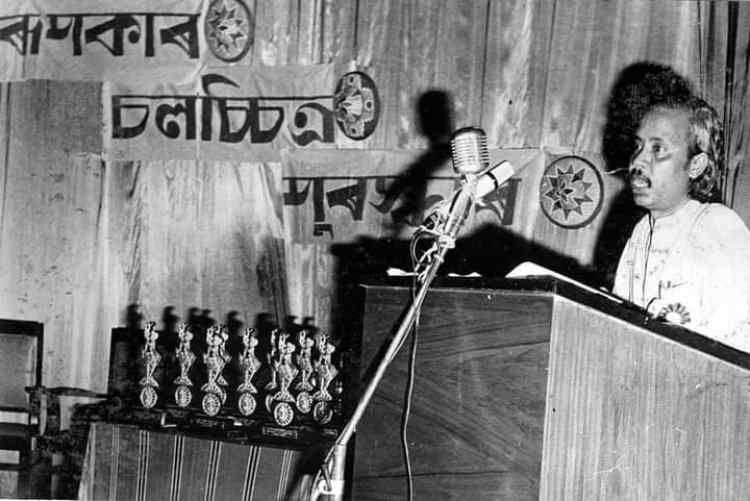
Image: Pabitra Kumar Deka
Roopkar's indispensable colleague Anil Kumar Deka became busy with a couple of others for the reception of the artistes inside. Light controller Hiramon Goswami had issued a final order to two of his assistants regarding lighting control. Satish Chauhan, assistant sound engineer at the Chitrabon Studio, had made all the arrangements to tape the entire show after fixing the dependable condenser microphone of an ultra modern sound system that was borrowed from Pragati Silpi Sangha. Playwright-director Deba Kumar Nath, an officer with the Yuva Vani section of the Akashvani Guwahati, had his tapes fixed to record the programme for Akashvani. In the green room, one of the organisers of Roopkar, Pabitra Kumar Deka and Roopkar's special representative and Transmission Executive of Akashvani's Dibrugarh centre, Kamal (Rana) Sharma had a close look at the programme scheduled for the evening. The two then came on stage, accompanied by Roopkar publisher Rana Deka, to see if everything was compatible as a show of this magnitude required much more coordination and follow-through. Rudra Barua, Director of Cultural Affairs of Assam, and Krishnamurti Hazarika, a Special Officer, joined them and briefly discussed the event, and after offering their suggestions, stood beside the stage wings, waiting to offer unconditional help whenever needed. Nagaon's Jiten Sarma, actor-director and editor of the daily 'Ganatantra', stood nearby.
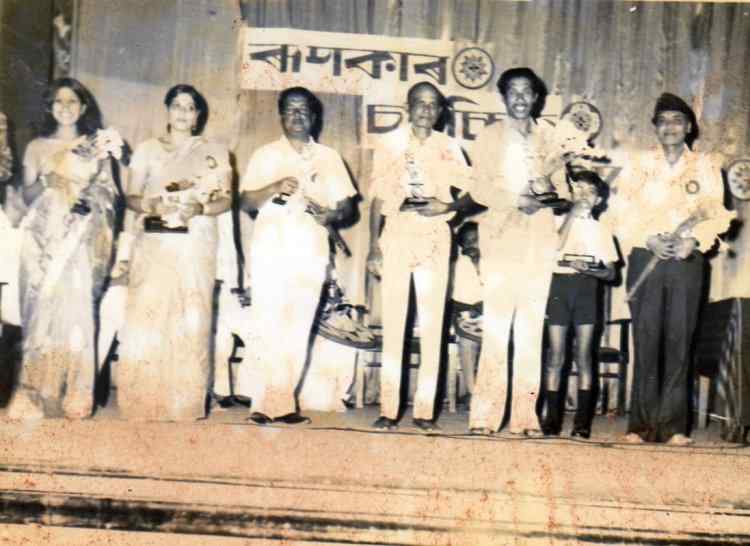
Image: Roopkar Film Award Winners
Now everything was ready inside : Pabitra Kumar Deka stood in front of the stand mike and Kamal (Rana) Sharma was holding a mike in hand to host the event. Rana Deka, Indra Bania and Bharati Pathak stood along the table carrying the specially designed Roopkar Awards and Certificates of Appreciation. While Juna Kotoky and Indra Bania's wife Minu Bania stood on the left side of the stage, getting ready to present a bouquet of Rajnigandha flowers, which arrived by flight from Kolkata in the morning on the same day, to the award winners.
After the room settled and everyone had taken their seats, the auditorium went dark. As the light was slowly unfolding on the stage in front of the screen, singer Parul Das greeted the gathering guests and the audience. Dancer Rita Bhuyan performed a rhythmic traditional Bol as a prelude to divine invocation.
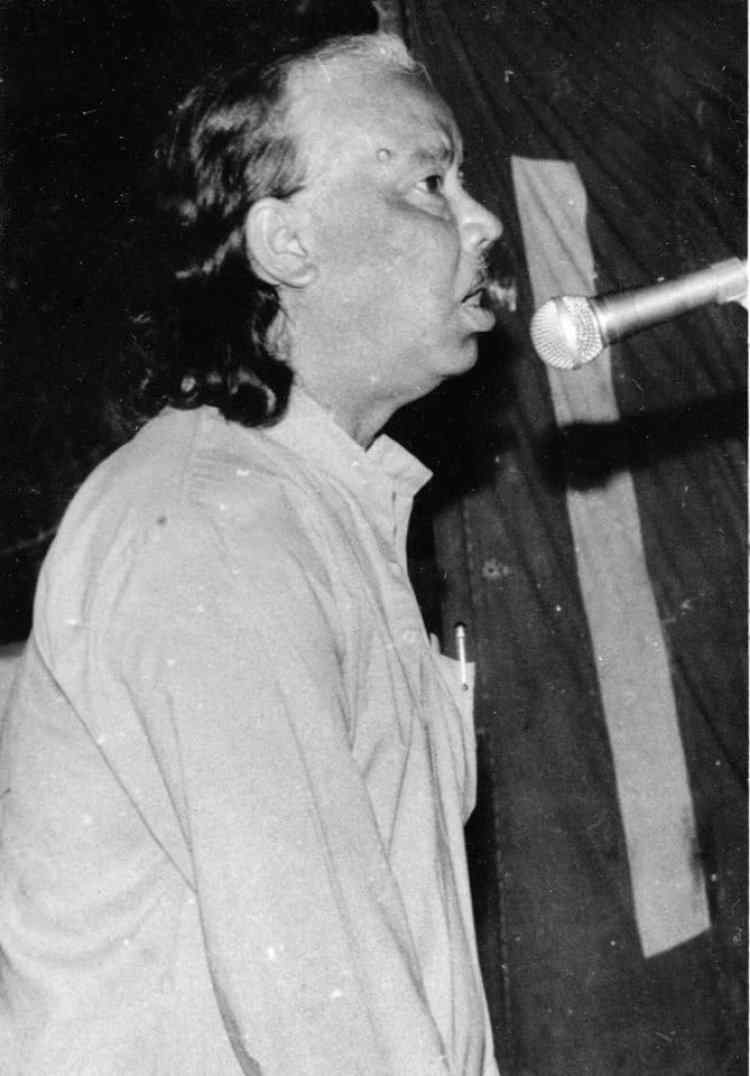
Image: Pabitra Kumar Deka
Once again, the auditorium went dark. As the curtains opened, a spot light shines on the stage. Pabitra Kumar Deka, one of the organisers of Roopkar, spoke about the purpose of instituting the 'Roopkar Film Awards' in a short candid speech. "Roopkar believes that although Assamese films are small in number, a healthy competition for its quality development will inspire the artistes and technicians of this art alike," he said. He also informed about plans to further expand the awards in consultation with everyone. Then, on behalf of Roopkar, he also invited upon the stage the Chairman of the Steering Committee of the Eastern India Motion Pictures Association Phani Sharma to inaugurate the cultural programme, Cultural and Home Minister Hiteshwar Saikia to preside over, West Bengal Information and Broadcasting Minister Subrata Mukherjee as the chief guest, veteran actor Basanta Choudhury as the special speaker and The Joint Secretary of the West Bengal Film Promotion Committee, Nitai Ghosh as the invited guest.
In his inaugural address, Phani Sharma wholeheartedly praised Roopkar's tremendous efforts and spoke at length about various aspects of the problematic Assamese film industry. "The film industry has got producers, artistes, technicians, distributors and exhibitors. This film industry cannot possibly flourish if all these people do not come together and work with the same dedication," he said. In his speech, Sharma suggested forming a 'Film Development Board' consisting of people already professionally engaged in the industry. And if this Board collects a film development tax of ten paise from every ticket sold in the theatres, it can generate revenue in the tune of 25 to 30 lakh rupees in a year, which can help solve much of the problems plaguing the Assamese film industry. He hoped that with this money, the difficulties of the people's theatres, producers and distributors can be removed.
This time, all eyes were riveted upon Kamal (Rana) Sharma, who announced the coveted Roopkar awards over the microphone. Guest Basanta Choudhury was requested to give away the prizes.
Finally the prizes were announced! The audience clapped and cheered along as the winners went up to the stage, and after receiving a bouquet gift of Rajnigandha flowers, were presented with the Roopkar awards and certificates of Appreciation by Basanta Choudhury, while tunes related to the prize winning films were performed live by the Vibration orchestra group, stationed behind the screen and invisible to the audience.
Each of the winners paused for a moment in front of the hand mike offered by Kamal (Rana) Sharma to answer Roopkar's queries.
Jehirul Islam, producer of 'Chameli Memsaab', which won 10 Roopkar awards out of the 11 presented in the inaugural Roopkar Film Awards competition, received the Best Producer award on behalf of Seuj Bolchhabi Santha.
"We started this film in 1971. We went through a lot of financial difficulties but it's mostly due to the generous contributions made by various people that the film could be successfully released in 1975," Islam said.
The award for Best Director was received by Abdul Majid for 'Chameli Memsaab'.
"The love that the people have showered on us, in that love, we've found a way, we are determined to move forward on that path," said Majid, who was delighted to receive the award. After that Majid pointed out some very key issues pertaining to the film industry. "The government has provided us with a lot of facilities and is thinking about the development of the industry all the time. But, today I wish to speak out openly, especially about those areas where we are facing the most difficult challenges. It's related to our cinema halls. We've got cinema hall owners and people from the exhibitors association here. A single broker books 20/40 halls, or even 50 halls in markets across the state. When it comes to running an Assamese film, they'd offer only 50% to 60%. We are sorry, but we have made a film with so much difficulty, a film that is now creating such a huge splash across Assam, and all they offered in terms of percentage is only 50%! They would say, 'who will watch an Assamese film?,'" Majid remarked.
He urged the exhibitors association to reconsider in this regard, and also the government to look seriously into the matter.
The Roopkar Award for Best Story Writer was received by Nirode Chaudhury for 'Chameli Memsaab'.
"I hail from Doom Dooma. My father was an ordinary shopkeeper in a tea garden. I've gained a lot of experience from him. I saw a lot of female labourers in the garden. I've had the experience of watching their day-to-day life from very close quarters. I saw a 'Pagla Sahib' roaming around in that Doom Dooma garden when I was studying in Cotton College. It took me by surprise, but everyone teased him with that name. "Pagla, pagla" – people would shout. Women would quickly hide their faces with veils and go inside, whenever he surfaced. One day, I closely followed Sahib and wrote the story after he shared it with me. The story was published in the 'Manideep' magazine, edited by Dr Mahendra Bora. The story was then translated into various languages of India. From there on, Abdul Majid has breathed new life into the story by turning it into a movie, which has brought numerous laurels for Assam and Assamese today," said Chaudhury, who was very pleased to receive the award.
The award for Best Music Director was received by Dr Bhupen Hazarika for 'Chameli Memsaab'.
Dr Hazarika took hold of the mike and sang a few verses from 'Chameli Memsaab's immensely popular 'Asom Deshor Bagisare Sowali..'. "This little Chameli was discovered by Nirode Chaudhury in the Doom Dooma garden. Majid decorated it, and I took hold of the melodies, breaking a few rules along the way while directing the music, and now it's such a wonderful feeling to receive this recognition, which is the recognition of the Assamese people. And the immense love that I have received after winning the National Award, you take it as that of the Assamese people, of Assamese culture, of Assamese creative talent. I am not only happy, but also very emotional," Dr Hazarika said.
The Best Actor was bagged by George Baker for 'Chameli Memsaab'. His role as the retired European tea planter Berkeley earned him widespread popularity. A visibly happy Baker expressed his thanks to the audience.
The award for Best Actress was won by Binita Gohain (Mitra) for 'Chameli Memsaab'. She offered her heartfelt thanks and gratitude to Roopkar as she gripped the award to her heart.
From a vivacious, free-spirited tea tribe girl to undergoing intense pain and suffering as a sickly married woman, stricken with leprosy, and deprived of nurturing her infant in her bosom, Binita Gohain had delivered a phenomenal performance in the movie, which is only her third movie appearance after Prafulla Barua's 'Rashmirekha' (1972) and Nip Barua's 'Soontora' (1973).
The Roopkar Award for Best Singer (Male) was received by Dr Bhupen Hazarika for the song 'O Bideshi Bandhu' from 'Chameli Memsaab'.
"A British citizen. India hasn't achieved independence yet. This man just loved Chameli. So while writing this song, Majid, Nirode and I had a discussion, and found that the man would just roam around, i.e., our George Baker. So there is something to be done when he's just roaming around. Then I wrote this song from the perspective of the schoolmaster – "O Bideshi Bandhu".
The award for Best Singer (Female) was bagged by Usha Mangeshkar for the song 'Chinaki Mur Monor Manuh' from the film 'Khoj'. As Usha Mangeshkar couldn't be present in person, Dr Hazarika collected the award on her behalf. She has, however, sent a letter to Roopkar, where she offered her thanks and gratitude for the award. Dr. Hazarika informed that the song recording of the Bengali version of 'Chameli Memsaab' directed by Inder Sen will be held in Bombay, and that's when he would present the award to Usha Mangeshkar on behalf of Roopkar by holding a small celebratory function in front of all the other artistes.
The Roopkar Award for Best Cinematography was received by Bijoy De for 'Chameli Memsaab'. "I am so happy to receive this honour from Roopkar, I will try to win more such prizes," he said.
The award for Best Supporting Actor was won by Abdul Majid for 'Chameli Memsaab'. The recipient of two Roopkar Awards that evening, Majid became very popular playing the eccentric tea-tribe man Monglu who would follow his dream girl, Chameli around, watching her every move, and reminding her – "Toi kar jiyari?" (Whose daughter are you?). The award was received by his son from Basanta Chaudhury.
The Roopkar Award for Best Supporting Actress was bagged by Rani Pathak. "I am really speechless, I just don't have any words to say. I used to perform on stage many times before my marriage, and even after marriage, I have acted in many films," she said. The thrilled actress thanked Roopkar and her director Abdul Majid for the honour.
West Bengal Information and Broadcasting Minister Subrata Mukherjee, who got up to deliver the chief guest's address on the occasion, showered praises on Roopkar's efforts, and after talking about the whole lot of constructive works happening in the film industry, he announced the two important decisions mutually reached by the two states after consultations with the Cultural Minister of Assam, officials of that department and the private entities associated with this art :
1. Every year, one Assamese film will be made in Bengali and one Bengali film in Assamese.
2. Every year, a week-long festival of Assamese films will be held in Calcutta and similarly, a Bengali film festival will be held in Guwahati.
In the end, Mukherjee wished that through the love of cinema, spiritual communication be developed between the people of the two states.
The handsome and dashing actor Basanta Choudhury, who has been fascinated by the natural beauty of Assam ever since he got off the plane, said that although the film industry of the eastern region showed the way to the whole of India in the 30s and 40s, today this film industry is struggling only to survive. "It's a matter of happiness that the state governments of the region have provided a lot of support for regional films. Now the filmmakers will also have to be engaged in making high quality regional films," he said, while concluding his speech.
After this, Nitai Ghosh, in his brief speech, lauded the schemes undertaken by the governments of Assam and West Bengal, and assured that the West Bengal Film Promotion Committee would always be ready to extend all kinds of help and support in this joint venture.
Dr Bhupen Hazarika in his speech said : "Many of those who have struggled hard for the development of the Assamese film industry for the last 40 years are no more among us. Today we have got many facilities, modern equipment at our disposal. Therefore, for the betterment of this industry, we need – concentration, intelligence."
Addressing the gathering, the state's Home and Cultural Affairs Minister Hiteshwar Saikia, who presided over the event, said that though there is still a lot of work to be done to develop and shape the Assamese art and culture, the government has already done a lot of work. "Apart from setting up a studio, staging plays, a music college will be completed this year itself. An Art Gallery has been set up. The songs of Sankardev and Madhavdev are being planned to be recorded. Pictures of the historically famous 'Barechahariya Bhaona' have already been taken," he said. He also said that the government is seriously planning to buy the historic 'Poki', the ancestral residence of Rupkonwar Jyotiprasad in Tezpur, and transform it into a vibrant cultural centre by preserving the immortal songs and plays of Jyotiprasad Agarwala, Bishnu Rabha and Phani Sharma there.
While speaking about the screening of Assamese films, he elucidated: "It has been made mandatory for every theatre hall in the State to screen films for the full 84 days in a year."
"The provision to pay back the entertainment tax regularly to the producer is already there. Arrangements have also been made to provide assistance ranging from Rs. 500 to Rs. 2,000 for the treatment of ailing artistes", he said.
Finally, on behalf of the Government, he sought the cooperation of the people in carrying out such development works smoothly, and expressed his gratitude to the invited guests, and thanked and congratulated Roopkar for organising such an event.
In response to a petition filed by Roopkar's Pabitra Kumar Deka on behalf of all the theatre activists and the theatre-loving people of Assam requesting a complete waiver of the entertainment tax levied on theatre troupes, mobile theatre troupes, jatra parties and cultural events in Assam, Saikia assured that he would look into the matter in depth.
After this, guests from outside the state were presented with traditional Assamese gamocha, xorai and japi as a gift, on behalf of Roopkar. The award presented by Roopkar was donated by the Guwahati branch of the Eastern India Motion Pictures Association and the gifts were presented by renowned businessman and film aficionado Biju Goenka.
As soon as the award ceremony ended, the evening's cultural programme started with the staging of Pragati Silpi Sangha's 'Amar Xonali Itihas', a poetry drama written and directed by Tarun Sharma. The various artistes who acted in the play were Kamal (Rana) Sharma, Pranjal Saikia, Ramesh Kandali, Minati Choudhury, Sanjay Das, Mahendra Goswami and Tarun Sharma. It was followed by a compelling musical show by the orchestra group Vibration. After this, Shubhajit Nath and Tapti Bhattacharya of Rabindra Bharati University, Kolkata, performed a number of classical Rabindra Sangeet songs. Mitali Chowdhury rendered an array of popular songs, including 'Asom Deshor Bagisare', 'Chinaki Mor Monor Manuh', etc. Finally Sudhakantha Dr. Bhupen Hazarika regaled the packed crowd for about an hour with his evergreen melodies. The last song was Paul Robeson's 'We are in the same boat brother'.
It was 11 pm when the first evening of the 'Roopkar Film Awards' ceremony ended.
The inaugural Roopkar Awards was a spectacle to behold that went through without a hitch, casting a spell over the audience for as long as it went on. But it wouldn't have been possible without the high resolve and determination demonstrated by the organisers – a culturally cohesive, honest, hard-working group of individuals, over the course of time. It was the culmination of weeks and months of preparation and planning by the organising committee, who left nothing to chance. It was bigger and elaborate than anyone had ever imagined, and unlike today, the show was held without any kind of corporate support.
The jury members of the inaugural Roopkar Awards consisted of distinguished litterateurs and educationists – Nabakanta Barua, Tilak Hazarika, Professor Durgeshwar Das, Udayaditya Bharali and Pradip Acharya.
The cultural show attracted people from different walks of life, age groups and social backgrounds as audiences. The show elicited strong emotional responses from the audiences. One such person, who was a witness to the event, is the noted filmmaker of Assamese films – 'Pratyabartan' (1993) and 'Sanskar' (1997), Ranjit Das, who vividly remembers the event and the excitement around it. Das came to know of it after reading a news item in a local daily. "A wave of excitement overwhelmed me when news about the first film awards show to be held in Assam came out in a newspaper", recalls Das, then a 16-year-old teenager and a huge film fan. As the Roopkar Film Awards approached, he grew more and more excited. "After an enquiry, I found out that tickets would be required to watch the show and the minimum price of tickets was Rs. 25! The organiser of this awards giving ceremony was Pabitra Kumar Deka, editor of the 'Roopkar' magazine," he says.
In 1975, Rs. 25 was way too much for a student. "I mulled over it for a while. Then I immediately decided to sell the two film-related newspapers – 'Screen' (published from Bombay) and 'Cine Advance' (published from Calcutta), and a collection of newspapers – to enjoy the award ceremony with that money. I made around Rs. 30 after selling the papers," he says. After enjoying the show, Das walked all the way home, some 7 kilometres of it, but he never felt any fatigue. "It was because both me and my friend Dhrubajyoti Mahanta, who came along with me, were overjoyed to see Dr Bhupen Hazarika and Abdul Majid talking to another person when we entered the District Library auditorium. We folded our hands in greeting and stood motionless, a little nervous, when we met Dr Bhupen Hazarika and Abdul Majid. Later, when the award ceremony began, I came to know that the other person they were talking to was none other than Pabitra Kumar Deka, the founder of the Roopkar Film Awards!" he adds. Like many other adoring fans, Das, too, was very happy, thrilled and ecstatic to see Roopkar awardees George Baker, Binita Gohain, Abdul Majid, Dr Bhupen Hazarika among others at the venue. A lot of emotions and thoughts ran through his mind while he was watching the show. The event was definitely a defining moment in his life. "I had a lot of colourful dreams. It is perhaps because of those dreams that I was able to participate in the Filmfare Awards in Mumbai, the National Film Awards, the State Film Awards ceremonies today. Moreover, I am now involved with the Sailadhar Baruah Film Awards (NE). I still feel very happy and elated to cherish those memories that are so much a part of my life, from time to time. In the end, I'd like to pay my heartfelt respects and tributes to Pabitra Kumar Deka," Das concludes.
The pioneering Roopkar Awards event was the progenitor of many more film awards and festivals, which have since been held in Assam
***
What's Your Reaction?





















































